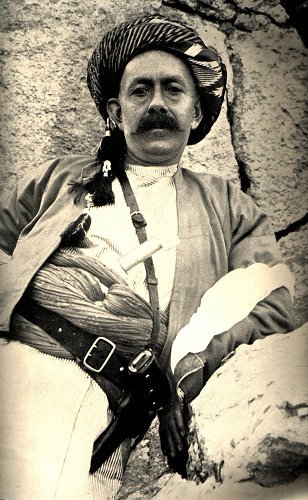
ERBIL, Iraqi Kurdistan: The newly contracted director of Iraqi Kurdistan’s Shekhan oil field says it is set to become the largest oil field in the whole of Iraq, and the minister of natural resources says the semi-autonomous region has massive natural gas reserves, which could supply the needs of the projected Nabucco pipeline for at least 100 years.
“[The Shekhan] oil field is expected to have around 1.9 to 7.4 billion barrels of oil,” said Tod Cozel, managing director of Gulf Keystone Petroleum, a company from the United Kingdom, which has won the contract for oil production at the Shekhan field.
The Kurdistan Regional Government (KRG) has now signed a total of 41 oil and gas production contracts with 42 foreign companies from 17 countries, and has begun to promote Kurdistan’s oil industry to the international market through a two-volume publication entitled “The Oil and Gas Year.”
The second volume was launched on March 3rd at a ceremony at the Rotana Hotel in the region’s capital, Erbil, attended by Kurdistan’s prime minister. At the ceremony, Mehmet Sepil, owner of Genel Enerji, which has been working in oil extraction and production in Kurdistan since 2002, was awarded the Person of the Year title by the KRG. His company now works in various Iraqi Kurdistan oil fields, including the Taq Taq field near Kirkuk.
The new publication evaluates the last 12 months’ activities in Kurdistan’s oil and gas industry, and includes an interview with Iraqi Kurdistan’s minister of natural resources, Ashty Hawrami, in which he talks about the importance of the oil and gas industry for Kurdistan’s economy.
“This industry…provides thousands of jobs for people in Kurdistan. We have built two refineries so far, and the third is under construction,” says Hawrami in the interview.
The book lists the 42 foreign companies that have signed oil and gas contracts with the KRG, and the line-up includes some big international names, such as ExxonMobil , Canadian firm Aspect Energy, Murphy Oil Corporation, Turkey’s Genel Enerji, Norway’s DNO, and Gulf Keystone Petroleum.
Among other facts, the publication states that oil reserves in Iraqi Kurdistan are estimated at 45 billion barrels, and that, since 2003, 49 new oil wells have been dug within the Kurdistan region, including Tawke, Taq Taq, Baziyan, Shekhan, Sarseng, Bardarash, Miran, Chamchamal, and Akre.
Sepil was recognized as Person of the Year due to his outstanding achievements in the field, which include his company being given the tenders for six oil production projects in Iraqi Kurdistan.
Interviewed in the publication, Sepil says it is expected that the combined oil production of Iraq Kurdistan’s Tawke and Taq Taq fields will reach 170,000 barrels per day (bpd) by the end of this year, although his company is eventually aiming for each field to reach 100,000 bpd.
Sepil also confirmed that his company was working on installing an oil pipeline to Kurdistan’s border, which would serve as an alternative to the Kirkuk pipelines, as this would increase Kurdistan’s oil exportation, and he called on the KRG to assist with the completion of this project as soon as possible.
In the publication, Ahmed Saeed, director of Forbes Energy Group, praises the suitability of Kurdistan’s land for the oil industry.
“Geologically in Kurdistan, there are fewer threats compared to in other countries, and when the political situation stabilizes in Kurdistan, the market for natural resource industries will flourish as well,” says Saeed.
In addition, the natural resources minister states that Iraqi Kurdistan is ready to supply the unfinished Nabucco pipeline with gas for the long term.
“According to the estimates of the government and some other parties, Kurdistan has about 106 to 212 trillion cubic meters of gas,” says Hawrami in the publication. “As we all know, it is planned that the Nabucco pipeline will import gas from the Caucasus and Central Asia to Europe, and it will require 31 billion cubic meters of natural gas a year. If we have [only] 106 trillion cubic meters of natural gas in Kurdistan, then we can supply Nabucco with natural gas for 100 years.”
Rudaw


That's very ambitious. I remember Q. Talabani said that 2 millions bbl/day would be in 2019..




















